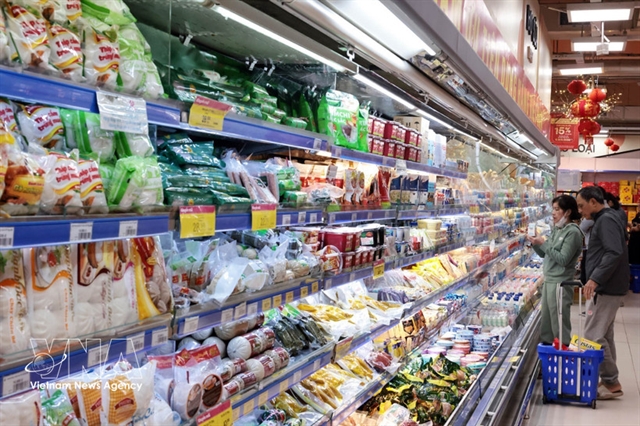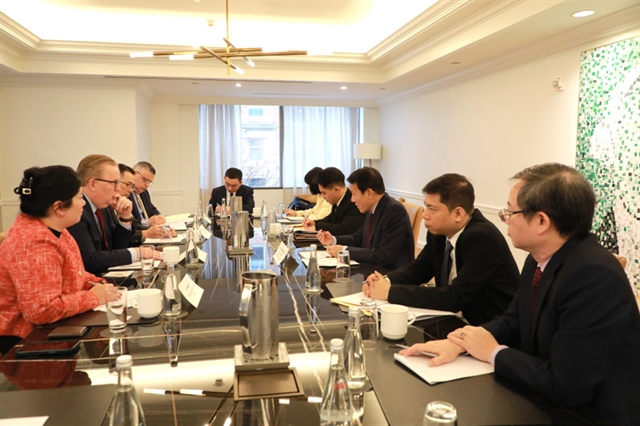 Economy
Economy


|
| View of a supermarket in Hà Nội. The VAT reduction policy will stimulate consumption, which will help boost production as well. Photo thoibaonganhang.vn |
Compiled by Thu Hà
HÀ NỘI — As the room for the fiscal policy remains quite large, Việt Nam in 2024 should continue to pursue the counter-cyclical fiscal policy, with a focus on increasing spending and maximising tax and fee exemption and reduction, to support economic growth, experts believe.
According to experts, in 2023, although there were still many difficulties in promoting economic growth, the positive effects of fiscal and monetary policies were shown. Specifically, the proactive and flexible monetary policy managed by the State Bank of Vietnam (SBV) contributed to controlling inflation, stabilising the macroeconomy and supporting the economy to grow by 5.05 per cent, among the highest in the region and the world. Meanwhile, the fiscal policy, including supporting packages for reducing and exempting taxes and fees of several goods and services, were quite effective, contributing to supporting the business community to overcome difficulties, recover and develop production and business.
Tô Hoài Nam, Vice Chairman of the Vietnam Association of Small- and Medium-sized Enterprises, said supporting packages to reduce value added tax (VAT), special consumption tax, and environmental protection tax on gasoline had a direct effect in helping recover production and business activities of many enterprises last year.
The total value of fiscal support packages last year was nearly VNĐ200 trillion. The policies, which were issued and implemented promptly, were highly appreciated by the business community as they created great support resources for them, Nam said.
Sharing the same opinion, expert Võ Trí Thành said the tax and fee reduction policies last year had an immediate effectiveness as it was quickly applied into practice and brought direct benefits to enterprises.
According to Thành, although the disbursement of some supporting packages, such as the 2 per cent interest rate preferential package worth VNĐ40 trillion from the State budget, was not high, they basically had a positive effect in some industries.
In particular, according to many experts, the good coordination between the fiscal and monetary policies in Việt Nam last year helped improve financial market liquidity, reduce pressure on interest rates and foreign exchange rates, and recover the bond and real estate markets, which importantly contributed to controlling inflation and stabilising the macroeconomy.
Frederic Neunamni, Chief Asia Economist and Co-head of Global Research Asia at HSBC, said the SBV's four-time reduction in policy interest rates last year, which was opposite from the tightening currency policy of many countries around the world, had a major contribution to controlling inflation in Việt Nam. At the same time, policies on reducing and exempting several taxes and fees, and restructuring due loans helped enterprises reduce input costs, which contributed to cutting product prices and stimulating consumption.
As the domestic economy in 2024 will still face many difficulties due to the impact of global headwinds while room for the domestic monetary policy remains quite limited, experts suggest that it is necessary to rely more on fiscal policy to help the country achieve the growth target of 6-6.5 per cent.
According to the macroeconomic research group of the HCM City Banking University, although the real estate and corporate bond markets still face prolonged difficulties, the fiscal policy, which still has an ample room, will become a key driver to boost domestic demand. Specifically, the wage rising policy will significantly increase the country’s GDP.
The researcher also forecast the country’s public investment in 2024 will accelerate.
Temporary tax postponement, and reduction of environmental and value added taxes will bring positive impacts to households and enterprises, Dr. Nguyễn Đức Trung, Principal of the HCM City Banking University commented.
Dr. Nguyễn Khắc Quốc Bảo, Deputy Director of HCM City Economics University, also believes the extension of the VAT reduction policy this year will have a positive impact on many enterprises. An increasing consumer spending will stimulate domestic aggregate demand, which will contribute to reducing inflationary pressure and continuing the recovery of economic growth in the first months of 2024.
According to the International Monetary Fund (IMF), in the 2022-23 period, in the context of declining business confidence and weakening loan demand, Việt Nam effectively applied a counter-fiscal policy. In 2024, the fiscal supporting policy should continue to be implemented in the direction of increasing public investment spending; maximising tax and fee reduction and exemption; and strengthening administrative and investment procedure reforms to stimulate aggregate demand.
In the long term, the IMF suggests Việt Nam should focus on streamlining the legal framework for digital economic development, green economy, circular economy, energy conversion and carbon credit market application.
Besides proactively restructuring operation, controlling cash flow risks, and diversifying capital and goods supply sources, enterprises need to devise roadmaps to apply green production, green consumption and investment in technology and human resources to increase competitiveness, the IMF said. — VNS




